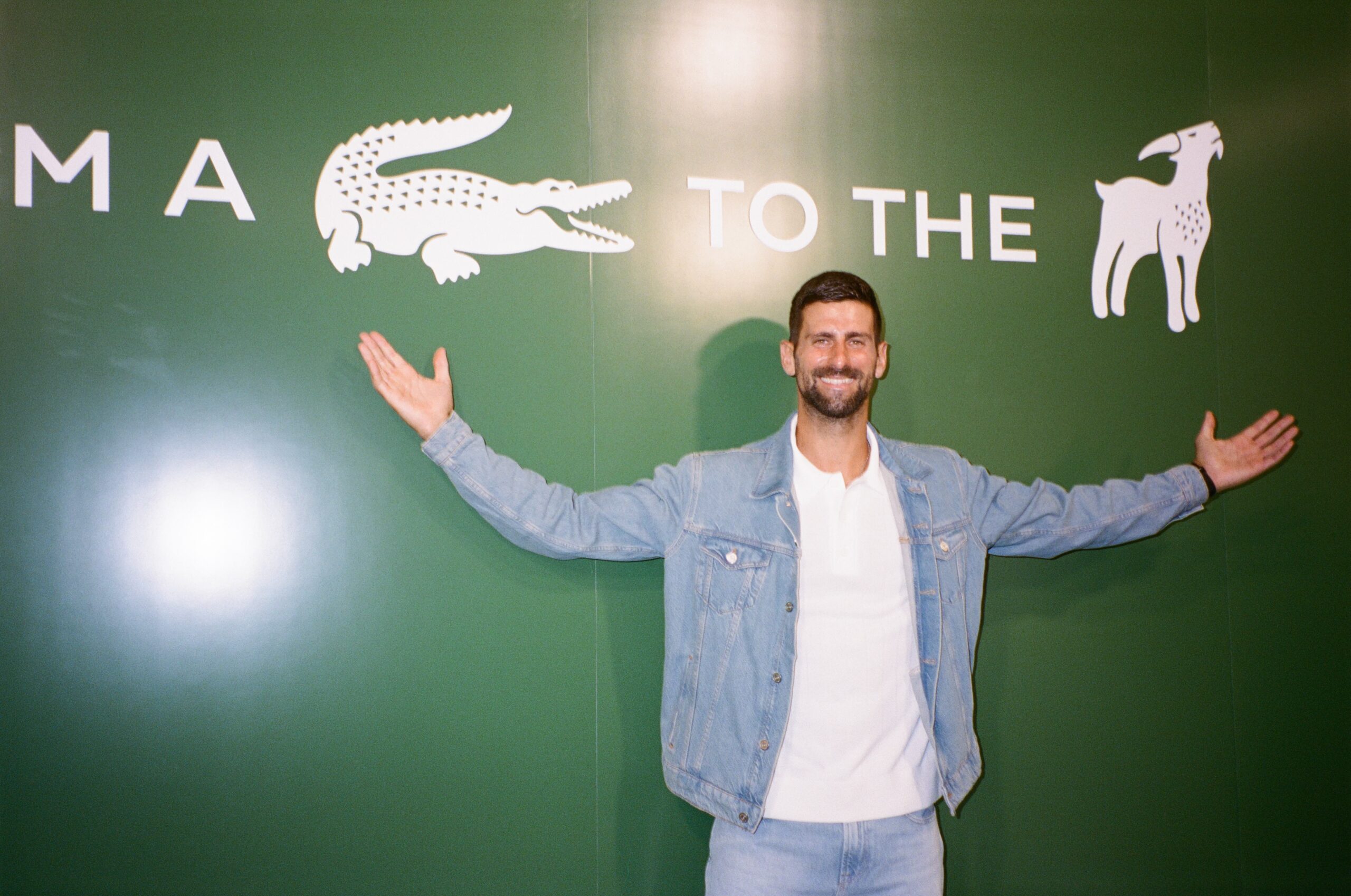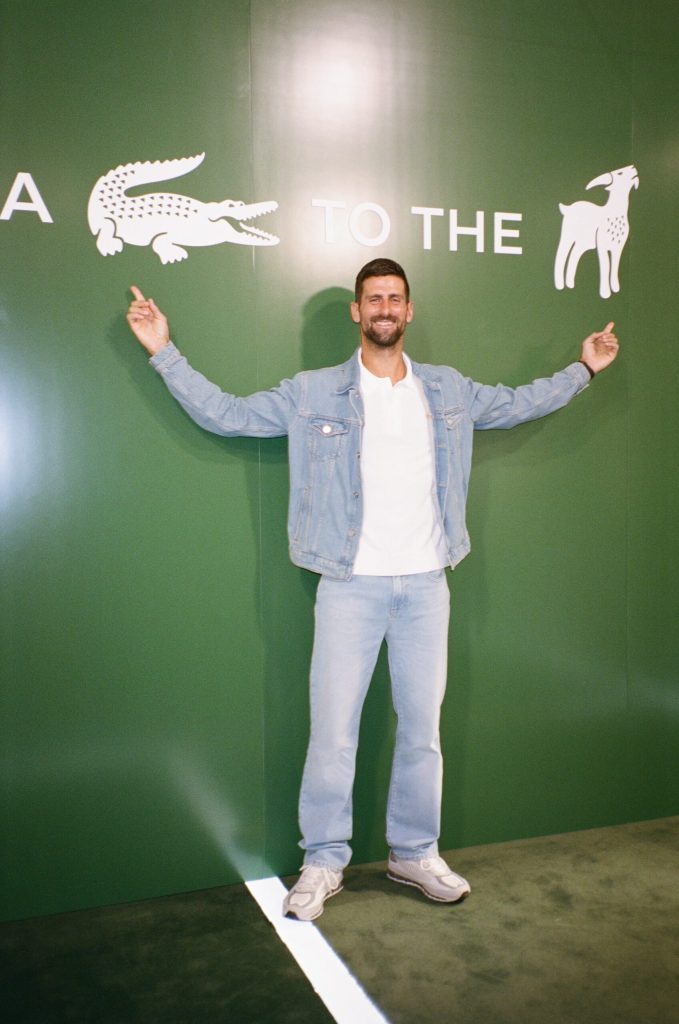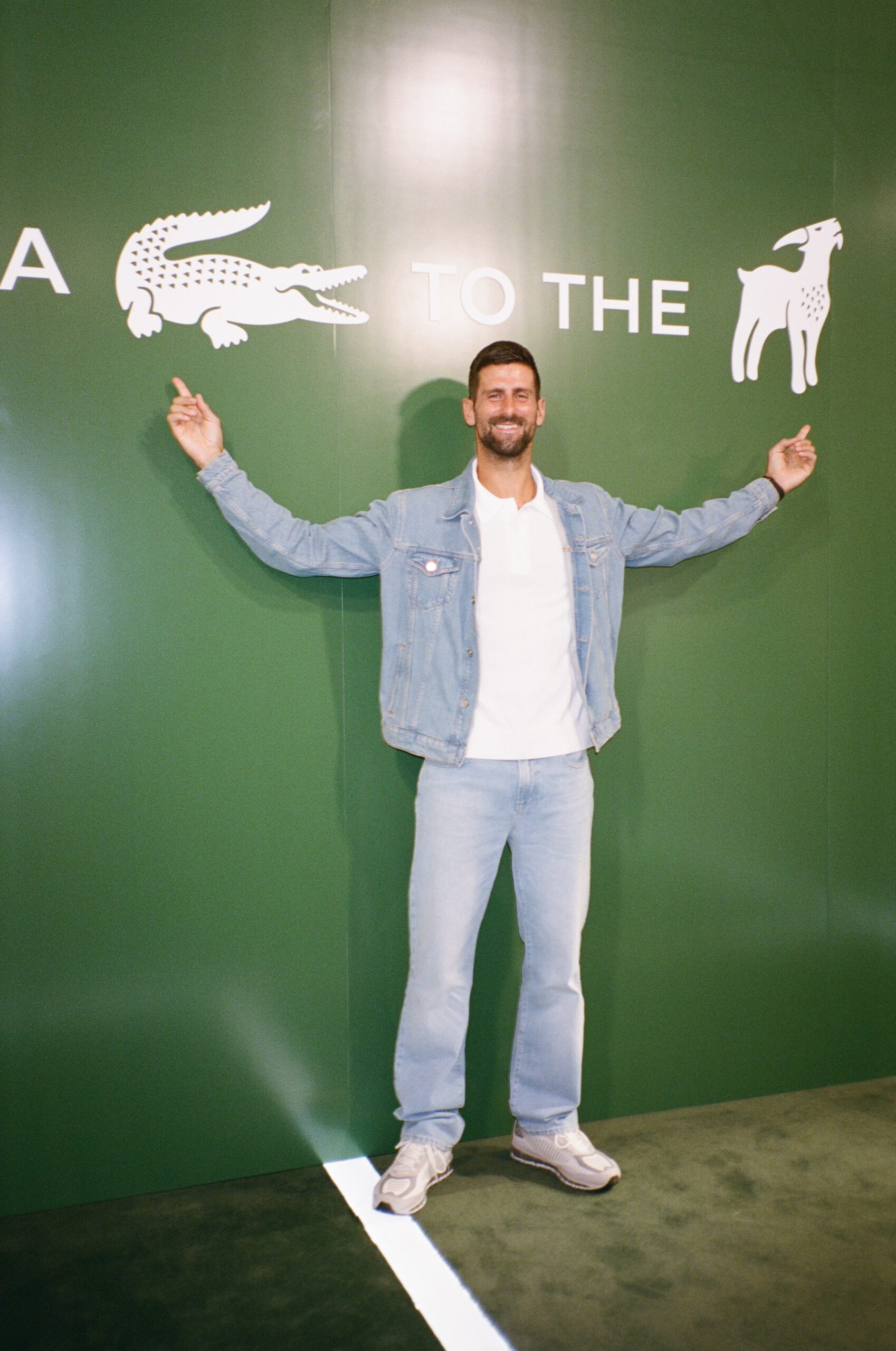
Novak Djokovic, photographed by Tiffany Champion.
By most unscientific metrics, the Lacoste crocodile is one of the oldest animals in the world. Founded in 1933, the year the label began manufacturing its first collared tennis shirt, the insignia has become synonymous with a certain kind of sporty refinement. But when Novak Djokovic rolled up to the 5th Avenue Lacoste store on Friday night, maneuvering gracefully around the hordes of screaming fans clamoring for his attention by the front entrance, the crocodile had become a goat—its neck craned upwards just slightly, almost arrogantly. This was not some sort of Kafkaesque gimmick but a tribute to the brand ambassador who returns to New York for this year’s US Open boasting of the most impressive resume in tennis history: 24 Grand Slam titles, the most by any man, plus an Olympic gold medal and a record 428 weeks spent as world number one. And while the GOAT debate continues to inspire the kind of sectarian conflict more common to politics than tennis, no man can lay a stronger claim to being the greatest player of all time than Djokovic, the last paladin of the sport’s Big Three, rounded out by the now-retired Roger Federer and Rafael Nadal.
Djokovic has never been particularly bashful about his dogged pursuit of history. Why else would the 38-year-old father of two continue to subject his body to the toil of the tennis circuit than to win a record 25th Major title, putting him alone, at last, atop the sport’s summit? When asked, however, about the horned animal now minted on a limited number of Lacoste polos and ball caps (a few items have already sold out), Djokovic appeared more self-effacing than usual. “It’s incredibly flattering to be called a GOAT… I prefer not to talk about it because I feel like it’s difficult to compare the different eras,” said the Serbian in deference to his tennis forbearers. “But of course, numbers are great,” he added with a smile. And numbers, we know, don’t lie. But nor does the body, and in his 22nd season on tour, Djokovic, still a fixture in the late stages of most tournaments he elects to play, has had to lighten his schedule considerably to give himself a fighting chance against Jannik Sinner and Carlos Alcaraz, who together have split the last seven Major titles. Djokovic, then, began his 2025 US Open campaign Sunday night—a three-set win over American Learner Tien—not having played a match since Wimbledon. But as he told me in a room festooned with photos of his winningest moments, that meant a bit more family time—and a preview of what life might look like when he decides to retire. “It’s not going to be easy for me to say goodbye,” he conceded. “That’s for sure.”
———
NOVAK DJOKOVIC: Hey, hello.
JAKE NEVINS: Hey, Novak. How’s it going?
DJOKOVIC: I’m good, I’m good. Thank you.
NEVINS: I appreciate you taking the time. I know you’ve had a long day of press. You’re one of the only people I can imagine Lacoste changing its logo for. But I’m curious, what does being called the “GOAT” mean to you? You’ve always spoken candidly about wanting to reach various milestones in your career, whether it be winning Olympic gold or your 25th Slam. Is the GOAT distinction something you take seriously?
DJOKOVIC: [Laughs] Of course I do. I mean, it’s incredibly flattering to be called a GOAT, particularly nowadays. But I don’t personally like discussing it, or when people try to ask me whether I do consider myself a GOAT of my sport, I always say that out of respect for the former champions in different generations of our sport, I prefer not to talk about it because I feel like it’s difficult to compare the different eras because of the equipment and conditions that tennis was played in. It’s just different. But of course, numbers are great. I’ve had an amazing career and I do understand why people love to talk about who is better or who won more, et cetera, et cetera. And at the end of the day, I think it’s good for our sport that there’s this discussion on the GOAT happening in the last whatever years because it just attracts more attention to tennis. I think all of us in tennis, we want that. We want people to be more interested overall to look at it, to be involved in tennis in any shape or form.
NEVINS: It feels like these kinds of debates weren’t as common in the early or mid-2000s, when I started watching you. Do you think the obsessive GOAT discussion is a product of the Big Three era?
DJOKOVIC: I think it’s the correct observation. I think it’s probably mostly due to the dominance of the Big Three guys and how much we won in the last 20, 25 years. And also, nowadays, obviously with social media, there’s an open debate happening every second on different topics and people are able to express themselves and start new trends or threads or whatever it is. So there’s more discussions happening, there’s more traction. But I think it’s also justified because of the dominance of the Big Three in the last 20 years.
NEVINS: I imagine something like this gets you thinking about legacy. As you wind down your career, have you noticed a difference in the reception you get among fans now that they realize you won’t be in the game forever?
DJOKOVIC: Yeah, I do actually. I’ve been receiving a lot of love and support from the fans in the last couple of years, particularly. And yeah, there’s a little bit of unpredictability in the upcoming year or upcoming years for me, like when it comes to my schedule and my career. I don’t know how long I’m going to play or where I’m going to play, et cetera. I mean, I still feel good about my game. Obviously, not winning a Grand Slam for almost two years now is something that I’m not used to in my career. I was winning at least one slam a year for many years. But at the same time, it’s normal, this kind of course in life where you have new generations coming up and taking the dominance. So that is fine, but I still feel like I can challenge these guys on the biggest stage, so I’m basically attempting to keep my body balanced and healthy to endure the stress that it needs to endure in order to get to the trophy match for a Grand Slam, which is a little bit more challenging for me nowadays than it was for most of my career. Those are some of the new circumstances that I have to face and embrace, but there’s still drive, there’s still flair inside of me, and I still want to compete for the biggest trophies.
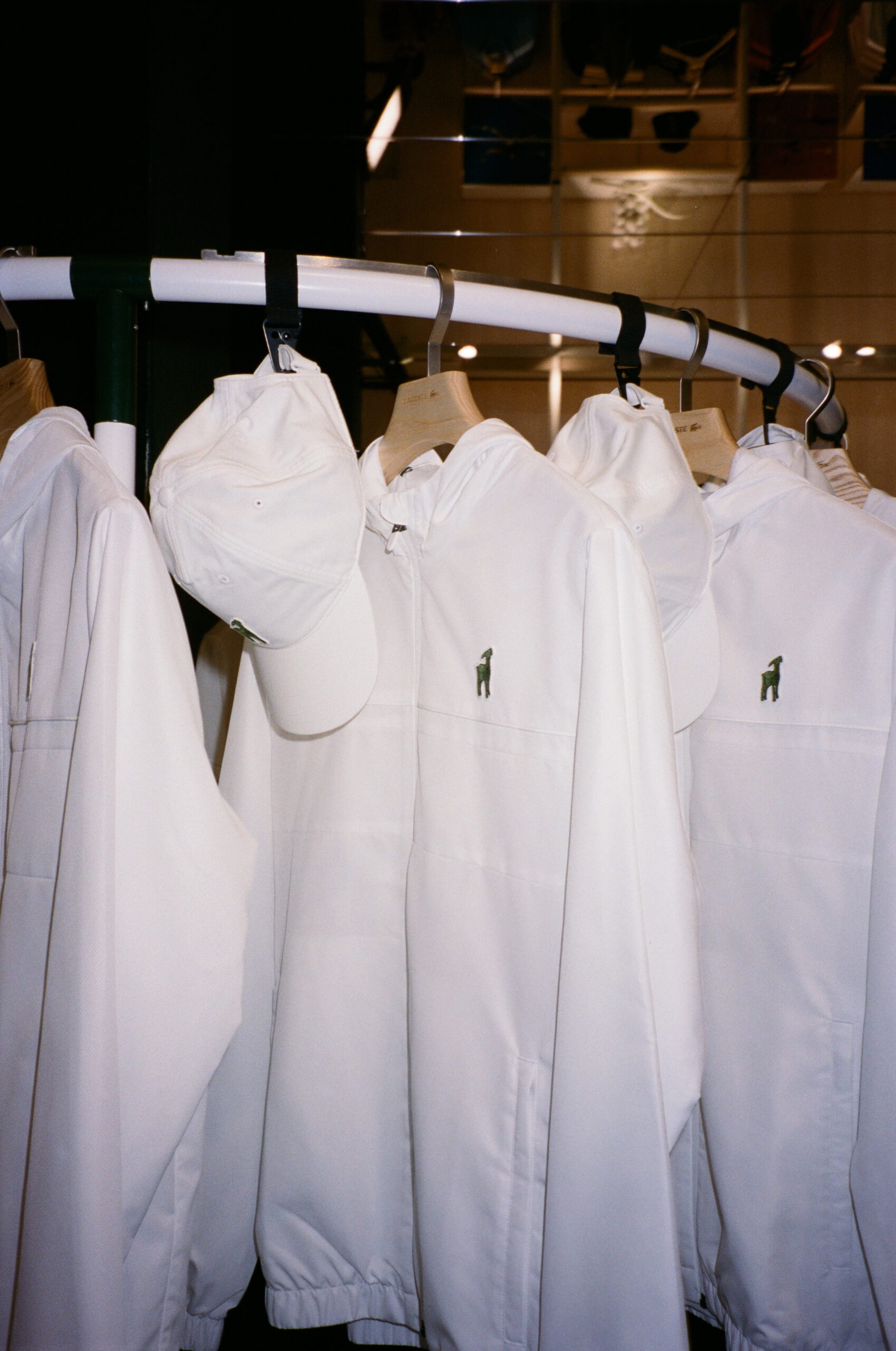
NEVINS: Well, I’m glad to hear that. Obviously, you’re still making deep runs at Slams, having reached three Major semifinals this year. What do you feel like you need to summon in yourself in order to get back to a Major final?
DJOKOVIC: I mean, we’re discussing it on a daily basis in terms of planning. And we have spent the last several weeks together training and getting ready for the US Open. I haven’t played any lead-up tournaments, so I had more time to practice and kind of get my body into the shape that is necessary. Of course, ideally it would be good if I played at least one tournament, but I decided to spend more time with my family, which is more important to me right now. But me and my team, we discuss the strategy, we analyze on a daily basis and kind of revisit the topics of how does the body feel, what do we think in terms of the game, mentality, et cetera. As you’re coming closer to the match, it’s more about preserving the energy and the vitality to be able to perform at your best in a best-of-five match. I’m actually motivated and pumped, but I do need to put an extra effort into recovery and trying to build as the tournament progresses. Obviously, every match can be the last match. It’s a knockout system, but at the same time you’re also thinking in advance about how you can progress in the tournament and still keep your fitness levels at par.
NEVINS: You mentioned paring back the schedule a little bit. You haven’t played a match since Wimbledon, but you did go on what looked like a lovely vacation with your family. 10 years ago, you would’ve been playing the tune-ups in Canada and Cincinnati instead.
DJOKOVIC: For almost the last 30 years. I didn’t have the kind of time during the summer that I have had the last couple of years. Well, actually, not a couple of years, ’cause last year was the Olympic Games, et cetera. So since this year, I mean, I had almost six weeks since the last match at Wimbledon and obviously spent the last three training. But the first three weeks were spent visiting different places—summertime in Europe is always great, being on the mountains as well, mixing it up, being in different places, but always with family and with close people in my life. I really did enjoy it. I did miss that for so many years. But I’m still competing, so it’s hard for me to completely switch off in a sense. But I do love the fact that I have an extra week here and there, for sure.
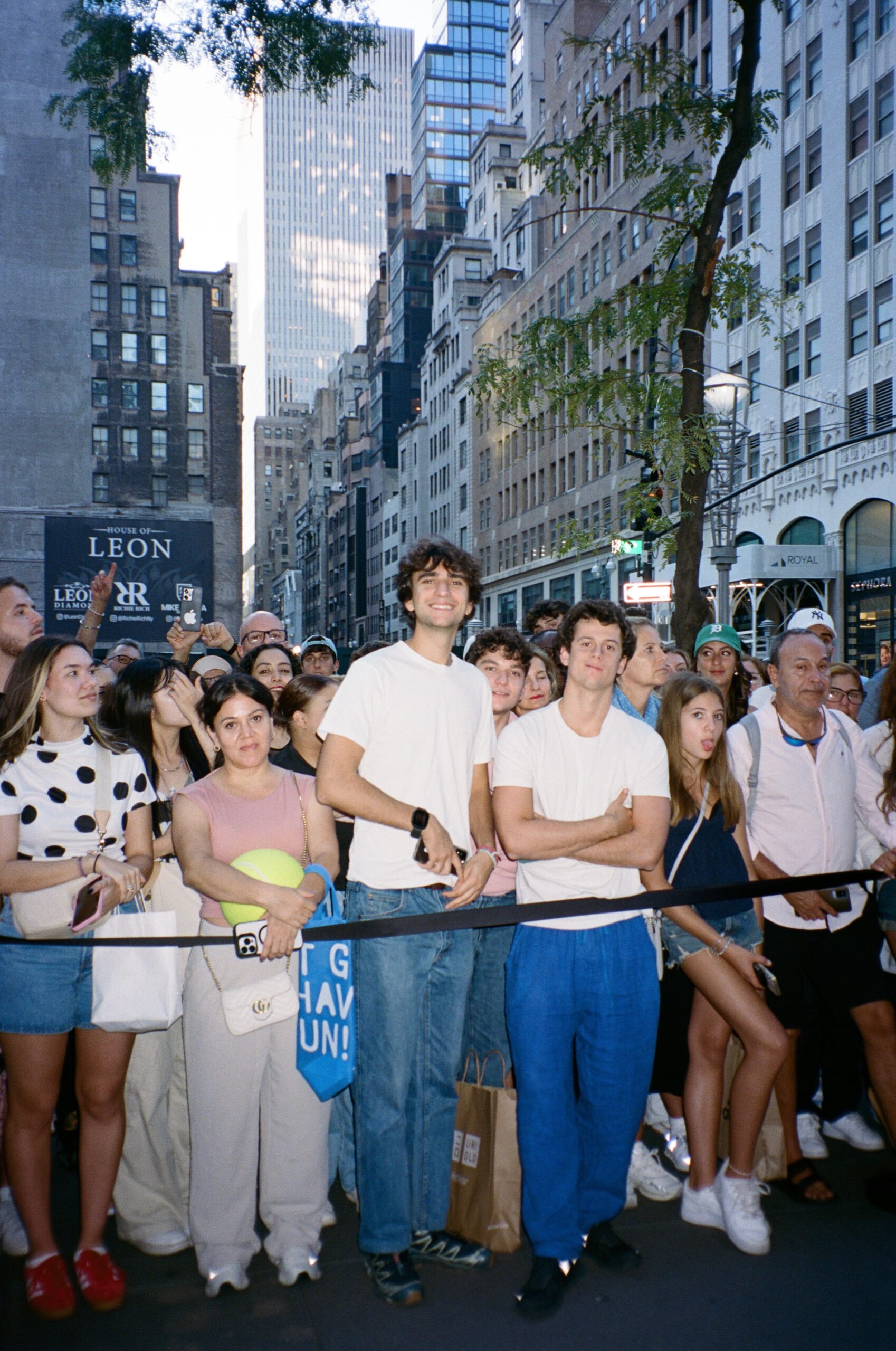
NEVINS: How much attention did you pay to tennis during that time, if any?
DJOKOVIC: Well, of course I’m following what’s going on. I see the highlights. I don’t necessarily watch matches from the beginning till the end, glued to the TV. But I do watch some highlights and I obviously follow my fellow Serbian tennis players and I’m mostly interested in how they’re doing. But of course I also follow the top guys, Alcaraz and Sinner playing finals of Wimbledon and then having a great run in Cincinnati. Of course, I keep myself up to speed and my coaching staff does too, because it’s important. We need to know how the others are doing and playing and feeling. It all adds up in the end and helps you when you possibly encounter them in the US Open. It’s a long tournament, but you never know. If I’m playing well, I might get a chance at the later stages to play the top guys.
NEVINS: I know we’re short on time, but I’ve got a few more questions. I’m curious if spending a few weeks away from tennis gives you a better idea of what life might look like once you retire. You’ve been doing this for so long that I wonder if there’s any fear about what comes next.
DJOKOVIC: Yeah. Well, I’m not afraid. I’m not concerned about my life after tennis in the sense that I don’t know what I’m going to do with myself.
NEVINS: Right.
DJOKOVIC: I’m actually building my brand, particularly in the wellness and longevity space. This is an area that I’m very interested in. So I’m building some businesses, I’m investing in others, and we’re doing a lot of great things, with some even greater things on the horizon. I have more time to think about how I want to build that legacy off the court and stay involved in tennis in different roles. But I don’t think every single day about my retirement and how that’s going to look. I’m not stressed about it. When it comes, it’s going to come, and it’s going to be right for me. I will know the moment and that’s it. But it is true that I have dedicated my entire life to this sport. I don’t want to say everything I know is tennis, but it has consumed so much of my energy and my life that it’s not going to be easy for me to say goodbye to tennis, that’s for sure. You have players that are able to make that transition. I feel like I’ll be able to make the transition into family and other things in life that I’m building and working on, so I don’t feel like I’ll have issues keeping myself occupied. But on the emotional side, it’s going to be hard because it’s just all I have known for so many years. But the moment will arrive. How soon or how far? I don’t know. I’m still trying to enjoy the moment while I can and play at a high level.
NEVINS: As you should. Novak, they’re telling me to wrap up. I’ll finish with this. Who would win in a fight, you or a crocodile?
DJOKOVIC: [Laughs] Well, there’s not going to be a fight because we are one and the same.
NEVINS: There you go.
DJOKOVIC: Thanks, Jake. Take good care, man.
NEVINS: You too.
